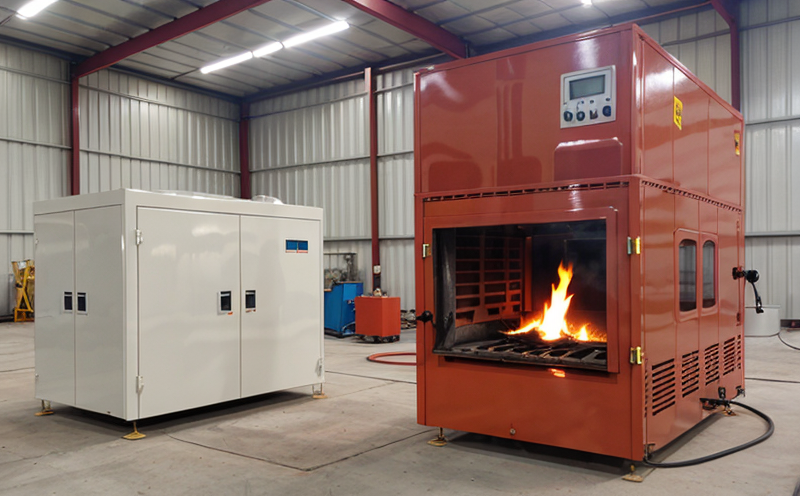ISO 11092 Thermal Resistance and Water Vapour Resistance of Fabrics
The ISO 11092 standard is a critical tool in the evaluation of fabrics for their thermal resistance (R-value) and water vapour resistance. This test is essential for industries where materials need to perform under extreme conditions, such as in construction, automotive, and textile manufacturing. The primary objective of this testing is to ensure that the fabric can withstand environmental changes without compromising on performance.
The process involves subjecting a specimen to defined thermal and moisture gradients to measure its resistance to heat flow (R-value) and water vapour transmission (WVTR). The test setup typically includes a climate chamber, where controlled conditions of temperature and humidity are maintained. This environment simulates real-world scenarios that the fabric might encounter in use.
For accurate results, careful preparation of the specimen is crucial. Samples should be conditioned to ensure they represent the material under actual usage conditions. The test methodology involves placing the prepared sample between two plates within a controlled climate chamber. One plate maintains a constant temperature while the other is at a higher temperature, creating a thermal gradient across the fabric.
The water vapour resistance is evaluated by measuring how much moisture passes through the fabric from one side to another under specified conditions of temperature and humidity. This helps in determining the breathability of the fabric, which is crucial for comfort in various applications such as clothing and insulation materials.
Once testing is complete, detailed reports are generated that include thermal resistance (R-value) and water vapour resistance (WVTR). These metrics provide critical insights into the material's performance under both thermal and moisture stress. Compliance with ISO 11092 ensures that fabrics meet industry standards for safety, efficiency, and reliability.
The results of this testing are vital in various sectors such as construction, where durability and insulation are paramount; automotive, where comfort and safety are key factors; and textiles, where both performance and breathability are critical. Understanding the parameters involved is essential for quality managers, compliance officers, R&D engineers, and procurement professionals who rely on accurate data to make informed decisions.
| Industry Sector | Application Example |
|---|---|
| Construction | Evaluating the thermal insulation properties of building materials |
| Automotive | Determining the breathability and moisture resistance of upholstery fabrics |
| Textiles | Assessing the performance of clothing in extreme conditions |
| Electronics | Testing the encapsulation materials used in electronic devices for durability |
- The test ensures that fabrics meet safety and comfort standards.
- It is crucial for ensuring longevity and performance under various environmental conditions.
- Results can lead to product improvements, enhancing overall quality and reliability.
- The testing supports compliance with international standards, fostering trust in the market.
By understanding these parameters and their implications, stakeholders can make informed decisions that enhance the performance of materials used across various sectors. This testing is a cornerstone for ensuring that fabrics meet rigorous industry standards, thereby contributing to safer, more efficient products.
Eurolab Advantages
At Eurolab, we bring unparalleled expertise and precision to ISO 11092 thermal resistance and water vapour resistance testing. Our state-of-the-art facilities are equipped with the latest instrumentation, ensuring accurate and reliable results every time. Here’s why you should choose us:
- Accurate Testing Equipment: We use high-precision instruments that adhere to international standards.
- Experienced Technicians: Our team of experts has extensive experience in material testing, ensuring consistent and accurate results.
- Comprehensive Reporting: Detailed reports are provided, offering insights into thermal resistance (R-value) and water vapour resistance (WVTR).
- Certified Compliance: We ensure that all tests meet the stringent requirements of ISO 11092.
By partnering with Eurolab, you gain access to a wealth of knowledge and resources, ensuring that your materials perform optimally under various conditions. Our commitment to quality and reliability is unmatched, making us the preferred choice for industries seeking top-tier testing services.
Quality and Reliability Assurance
The ISO 11092 thermal resistance and water vapour resistance tests are critical in maintaining high standards of quality and reliability. Ensuring that fabrics meet these stringent criteria is essential for industries where performance cannot be compromised.
- Consistent Conditions: The climate chamber used in the test maintains precise temperature and humidity levels, ensuring consistent results across multiple samples.
- Reproducibility: The methodology of ISO 11092 is designed to be highly reproducible, allowing for accurate comparisons between different materials.
- Data Integrity: Our rigorous quality control measures ensure that all data collected during testing is accurate and reliable.
- Compliance Verification: By adhering strictly to ISO standards, we verify compliance with international regulations.
The accuracy of the results directly impacts the performance and safety of the final products. Ensuring that fabrics meet these stringent criteria not only enhances product quality but also builds consumer trust. Our commitment to maintaining high standards is reflected in our unwavering dedication to providing reliable testing services.





